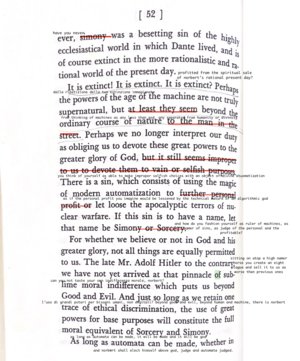User:Ada/SI21
pad databae
week 1
urgency objective = possible futures by looking at the past, imagined technical futures.
◦ the technogalactic software observatory and example of regarding software as an object of research; a refractive approach which helps build a collective set of moments where we scrutinise technological objects.
TTY
◦ model 33 from teletype corporation. The moment when ttys and communication get connected. They were around from 1920s and connected with the telegraph, over wire over radio, a message typed that arrives and is printed at teh other end (media, military users). First half of 20th century computers are big expensive, only for state administration, military, big companies.
week 2 | inscriptions
◦ inscription = words that are written or cut in something (a physical action onto a material that leaves a trace). spacing, metre, material support, fragmentation and decipherment, labour.
◦ the digital inscription of "thought" then, is at once destructive(rupturing, absenting) and profucting (revealing, presenting)
◦ corpus|inscriptonum|latinarum = to the manes, the earth holds this body, a stone this name, the air this soul. it would have to been better never to have touched the ground.
◦ John Perry Barlow- A declaration of the independence of cyberspace
◦ what is the inscription in the tty? the binary, the paper, the process, the keyboard, the carbon paper, concept of revision = modification of existing inscription, rub out button that can just amend the last bit
otherwise = one would type a software that would type on paper the adjustment
until the screen changed the concept of revision, inscripotion into memory has two modes:
-inscription into hardware
-inscription into the screen, volatile inscription that allows for continuous revisions, RAM memory as well
. aymeric lecture
At the end of this we will know what experimental publishing is, unpacking different elements of THE sentence:
"XPUB focuses on the acts of making public and creating publics in the age of post-digital networks :)"
-three elements: making public, creating publics and post-digital networks
making public
scientific explanation = transmission of signal, about sharing information.
artistic explanation = artistic medium, paint, ceramic, writing
there is a myth that actual carrying of information belongs to mass-media related activities. the distinction is not so simple."Against Expression", collection of writing as an artistic medium, Nemerov, First my Motorola (an example of something beyond the dichotomy). When you try to understand making public in terms of media/medium, you see it as both carrier of information and artistic medium. in practice, what you get to do at XPUB is the space in between.
intertextuality = essentially how text can refer to other by appropriation, absorbing / hyper-textuality = systems created by text interacting with each other / and para-textuality = how text can be influenced by other text, things that affect how you interpret the text.
mediality = whatever can be said about the text can be applied to whatever medium.
creating publics vs collective practices
production of unwanted knowledge, that nobody has asked for, no agenda and no value. if you talk about this from a fine-art perspective people will come after you because you are talking about the usefulness of art.
=intention, agenda, usefulness, purpose becomes ideology and politics. aesthetization of politics in art school
- the question of production has become more important for him. cultural entrepreneurship appears on the scene, the mechanism driving the development of art and design academies. bourgeois vs. marxist approach (looking at how things are produced!). we can produce art and design with radical politics in their content but that challenge nothing, just give the illusion that there is some sort of autonomy. this way, the politics is the way it is produced and distributed instead of the content. the trap nowadays is that it is okay to be political within the given production framework, when you try to do things differently it becomes harder. like a piece of music that has been made in a way that challenges collective dimension or mode of production rather than one that talks about politics.
post-digital networks
post-digital = digitality and new media, constantly moving to new frontiers. digital revolution hangover happens in the late 2000s realising that the promises were not changing society so much. going further than the digital not changinging, to a refusal to only engage with digital practices.step out from the consumerist aspect of the latest is the greatest and pick the medium even if old.
-entanglement, situatedness, bootstrapping (chains of dependencies).
week 3 | STS with roel rascam abbing
-> media archeology, technological history as an important part of technology.
-> STS, science and technology studies (humanities 👀 looking at scitech). social construction, the machine in a social context as both object and standard and environment. instead of seeing it beyond the human, STS sees it with the human and the networks that built it and uses it.
glossary .standards = technical objects that describe how processes relate to one another. empires make standard measuring unit. initially for taxes! duck shaped weight. .standardisation = organisations grow to engage the measuring units, politically interesting due to advantages. time measurements systems are an example of standardisation, with the shortening of global distances. .infrastructure = (structure vs infrastructure), facilitates a certain way, the first is the parts, the second the underlying foundations. the better it works the less you realise. always relational. a thousand standards and infrastructures .interoperability = computational infrastructure, the relations of standards and how they connect. dongle hells are an example of interoperability. backwards compatibility! .installed base (susan leigh-star, 1999) .legacy = installed base becomes a weight, halts the speed of innovation. working with legacy systems is seen as negative even though everything runs on legacy. internet/browser standards
open standards and the digital age

